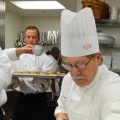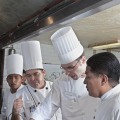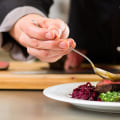Reasons to attend a culinary arts school Learn to cook: The main reason to go to cooking school is to learn to cook. This means learning to use common equipment and tools in professional kitchens, learning to use spices, learning to follow recipes, and learning to make your own recipes. If you really want to learn to cook, and I mean really learn to cook, you'll have to undo some habits to develop better ones. You'll have to check your ego from time to time because creativity is not so much emphasized as consistency.
Culinary or cooking school can be a humiliating process, and the “yes, chef” mentality is real. But if you're willing to learn and, by extension, to change, you'll actually learn to cook and change for the better. This blog will look at just a few of the reasons cooking schools are seeing an increase in student requests. If you love to cook and you see yourself working in the food and hospitality industry, this blog is for you.
Here are some of the most notable benefits of culinary school. Often, people think that the best way to move up in the food industry is to simply start working. While there's nothing wrong with getting hands-on experience, earning an associate degree at a cooking school will set you apart from other job applicants. In addition, you will understand more sophisticated techniques thanks to your education.
Do you think all you'll learn when you go to cooking school is how to cut, dice, sauté and fry? Think again. You'll learn a variety of important topics including food safety, culinary management, nutrition, and more. This will help you access jobs as a more complete culinary craftsman, as it provides a theoretical and practical basis. How long is cooking school going to last? It's a common question.
You'll like the answer, especially if you're ready to get started quickly as a sub-chef, cook, or baker. An associate's degree only takes two years. During that time, you'll gain all the basic knowledge you need to feel confident in any kitchen situation. Cooking schools aren't just for Gen Z students.
They are for anyone who has a passion and wants to explore the culinary arts. Whether you're 18 or 81 years old, you can find the right accredited program that fits your needs. Maybe you want to open your own restaurant one day. Maybe you have a goal of becoming a franchisee.
Either way, going to cooking school will provide you with the basic tools for running a restaurant and running a business. For example, you may want to take specialized classes, such as strategic branding and business management or financial management of food and beverages. Many consumers are eager to find out how to eat healthier. As a culinary expert, you can train yourself to be at the forefront of the healthy and sustainable living movement.
Who knows? You could even end up taking your culinary experience internationally as a social media influencer or social media star. When asked, 95% of working professionals want flexible hours. Depending on the type of work you do, you may also be able to choose your preferred hours as a culinary expert. For example, you may want to stay home with your children during the day and organize your kitchen tasks to work at night.
Ready to start exploring culinary arts schools? Check out the culinary programs at Lackawanna College in Scranton and Sunbury and complete an inquiry form to begin the admissions process?. Lackawanna College, Scranton Campus, 501 Vine Street, Scranton, Pennsylvania, 18509.Naturally, we would say “yes”, but we wouldn't if we didn't believe it to be true. The idea of leaving school, getting an entry-level kitchen job (doorman, for example) and moving up to the position of chef is quite outdated, and it's getting harder for people to take that route with each passing year. Many restaurants recruit and train chefs who start out as apprentices or junior chefs, so those who are serious about working in hospitality choose to attend cooking schools.
Below, we'll break down what cooking schools offer, how much they cost, and what you'll learn. Beyond these kinds of opportunities to meet established chefs, cooking schools are also a place to meet a side band of like-minded fellow students. The Culinary Institute of America is a much larger school, but it also maintains the class size of 16 students per chef instructor. But, as he and other chefs will point out, not all restaurant chefs are particularly interested in cultivating their employees.
And there are also other skills that Walsh believes cooking schools should teach students to become successful restaurant chefs. Pastry chef and dean of the San Francisco Cooking School Bill Corbett skipped culinary school himself. While laws, requirements and requirements vary from country to country, every corner of the world needs good cooks and chefs. While San Francisco pastry chef Bill Corbett has a lot of criticism for culinary school, he says, “I don't think it's appropriate to condemn the entire system.”.
Many culinary programs also include some type of internship program that provides another opportunity to interact with professional chefs and potential employers. Some chefs argue that some cooking schools have misled or failed to educate students about these realities of restaurant life. But having a degree or certification from a culinary school doesn't necessarily give job applicants an advantage, as several other chefs have indicated. Working as a sub-chef or becoming a food and beverage director for a hotel brand may not be.
I'll never forget the feeling of being dressed for the first time in my chef jacket, sitting at a huge stainless steel work table pretending not to be evaluating my classmates, even though that's exactly what we all did. Some may simply not have realized that they could make a career out of research and development or nutrition, while others may learn at some point along the way that the difficult life of a restaurant chef isn't what they want. To help manage them, the school has a dedicated internship office that ensures that students do more than just drink coffee for the chef. But, I mean, that begs the question: Is the program you offer the Juilliard Culinary School?.
. .


